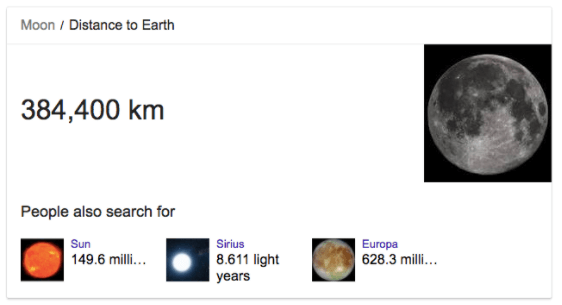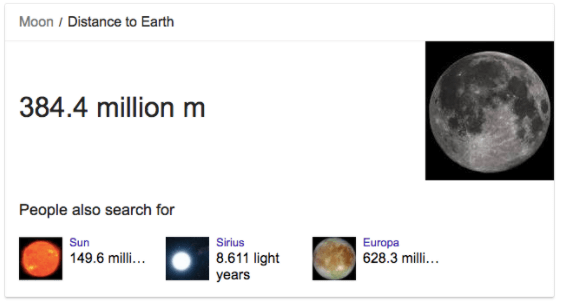What is natural language processing?
Natural language processing (or NLP) is a field of computer science, artificial intelligence, and linguistics that has to do with the interactions between computers and humans using natural languages. As such, NLP is related to the area of human–computer interaction. Many challenges in NLP involve natural language understanding — that is, enabling computers to derive meaning from human and natural language generation — the ability to produce textual content.
How does Google use NLP?
Since Google Knowledge Graph and Hummingbird were released, Google reads human language, through Natural Language Processing.
When I type in Google’s search box “moon distance,” that is what I get:
You may think this is simple keyword matching, but it is not. In fact, if I ask “How far is the moon?” I get the same answer.
Google’s ability to understand language goes further. If I search “moon distance in meters” that is what I get:
In short, Google knows I’m referring to the same thing and gives me the proper answer.
How does WordLift uses NLP?
WordLift suggests to content editors relevant fact-based information, images and links by analyzing content being written (either pages or post).
WordLift uses Named Entity Recognition (NER) and Named Entity Disambiguation (NED) to extract Named Entities from textual contents.
Editors can reconcile entities extracted from their posts and pages with equivalent entities available on other sources (i.e. DBpedia or Wikidata). By automatically linking entities WordLift helps machines unambiguously interpret the context of the content being written.
This information, derived from these large open graphs such as DBpedia, is also used by WordLift to add the semantic markup using the vocabulary of schema.org.
What are Word Embeddings?
Word embeddings (or text embeddings) are a type of algebraic representation of words that allows words with similar meaning to have similar mathematical representation. A vector is an array of numbers of a particular dimension. We calculate how close or distant two words are by measuring the distance between these vectors.
Read more on how to optimize your Title tag SEO using text embeddings.
Here is a quick intro to word and graph embeddings.
How does NLP help you with SEO?
As we mentioned before in this article, NLP helps machines understand the context of what humans are writing. Combining NLP with semantic web technologies can significantly help you improve SEO and gain you a fair advantage over your competitors. If you are curious to know more about this topic, you can read our article about how advanced SEO strategies using NLP can help you improve your rankings. The article explains everything in detail and provides also some useful examples and cases.
Natural language processing (NLP) is the artificial intelligence used by computers to interpret messages from humans into information, an example of that is the keywords used by search engines to retrieve relevant, information, graphs, and images.
Natural language processing uses computers to process and understand language. NLP techniques are: Named Entity Recognition (NER) keyword extraction Stemming and Lemmatization Bag of Words Topic modeling Sentiment Analysis Sentence Segmentation
Natural Language Processing (NLP) is the communication tool between humans and computers, it exists in many forms such as spelling check, using google translate, and semantic search
Yes, Google uses Natural Language Processing, this is how Google interprets keywords to find the optimum and most relevant topic and show them in a specific sequence. Google uses NLP to automatically transform your search queries into actionable results
Google uses NLP to understand the context of what humans are looking for using multiple NLP techniques. Keyword extraction can determine the topic and relevant results while the sentiments analysis determines the emotional attitude of the user. With the amount of information available on the web SERP analysis is an essential step in the process of content optimization to outrank the competition on Google.
Yes, google NLP is free but with a maximum limit of 5000 units per month, additional units are chargeable
Human language processing is the artificial intelligence used by computers to interpret messages from humans into information, language processing uses multiple techniques to convert human input into results

